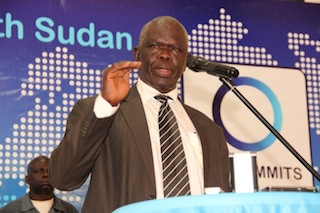South Sudan government tables revised 2014 budget before parliament
September 18, 2013 (JUBA) – South Sudan finance minister, Agrey Tisa Sabuni, presented a “revised draft” of the national budget to parliament on Wednesday in the capital Juba.

“The 2013/14 budget consists of an overall resource envelope of SSP 17.3 billion, financed through a combination of oil revenue, non-oil revenue, loans and budget support from donors,” Minister Agrey told a combined session of both houses of South Sudan’s parliament – the National Legislative Assembly (NLA) and the Council of States.
“If oil production returns to full capacity, income from oil will reach up to SSP 10.6 billion, and a stronger economy will help raise SSP 1.5 billion in non-oil revenue,” he added.
Nevertheless, loans of SSP 4.9 billion will be required to bridge the remaining financial gap, Sabuni says.
Minister Sabuni presented a full breakdown of the budget. Spending on security and law enforcement has decreased to 50% of the budget down from 58% in the 2012/13 budget.
The share of spending on capital investment increases to 16% of the budget compared with 7% in 2012/13. Transfers to states have also increased by 24%, reflecting the new and additional grants to states and counties, he said.
National monthly spending limits must remain at the austerity level of SSP 555 million per month during the first 6 months of 2013/14, and will increase to SSP 985 million in January 2014 if sufficient resources are available, minister Sabuni added.
Other spending items include:
- Construction of large and small-scale infrastructure is budgeted at SSP 741 million with more than 52.6% (or SSP 390 Million) allocated to maintenance of roads and bridges.
- SSP 291 million is set aside for National Assembly’s Constituency Development Fund (CDF). This is the funding to each Member of Parliament for development projects in her/his constituency.
- SSP 130 million is earmarked for agriculture and creation of jobs.
- SSP 580 million is allocated for what Minister Sabuni calls “other priorities” including preparations for census, the elections and constitutional review.
“Overall, the changes introduced in the 2013/14 budget will accelerate development progress in South Sudan,” Sabuni claimed.
If oil production continues, he says, sufficient additional resources can be mobilized and it will be possible to significantly increase spending in the second half of the fiscal year.
Members of Parliament who Sudan Tribune was able to speak to on Wednesday say they will support the approval of the budget.
Mary Riro Juac MP from Upper Nile State, SPLM—DC said too much time has elapsed for the assembly to delay passage of budget.
“Our citizens are waiting for this budget. It is very important to know what is set aside for a fiscal year,” Juac said.
Bashir Bandi MP from Western Equatoria state says the budget is comprehensive despite half of spending going to South Sudan’s security agencies.
“You cannot develop if there is no security. Through stability, you will be able to invest locally and you will be able to attract investors. Investor cannot come to South Sudan if there is no security,” Bandi said.
The budget is now referred to parliamentary finance committee for review.
Under the National Legislative Assembly Code of Business, the budget has to be approved or disapproved within 45 days.
Sabuni replaced Kosti Manibe Ngai as part of the reshuffle in August, having previously served as an advisor on economic affairs to president Kiir.
(ST)
